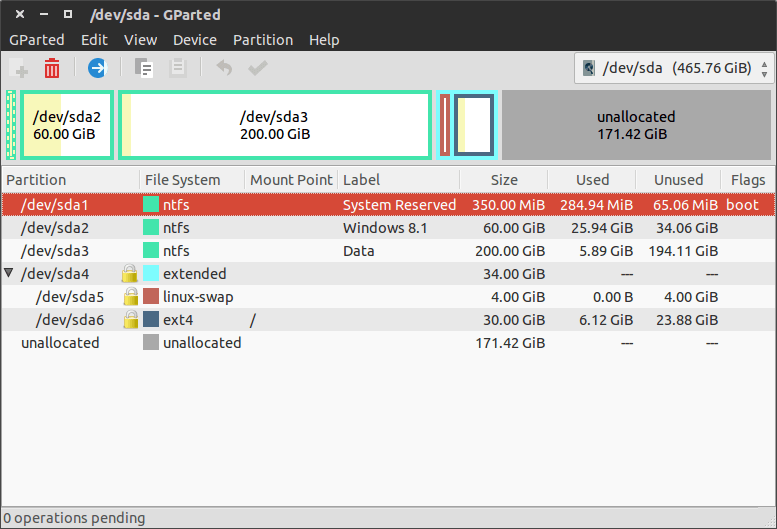Hey folks, please let me know if this is the inappropriate place to post this thread.
My laptop is quite an old model & has none of the UEFI problems which plague more modern ones. Moreover, I have completely disabled Hibernate both through Power Options as well as "powercfg –h off" in elevated cmd.exe in addition to dedicating a very minimal 1408MB to the paging file in Virtual memory.
Of my single 500GB HDD, 350MB is System Reserved while 60GB is Windows 8.1 System partition (of which 32GB is in use with programmes such as MS Office '13, Chrome, Firefox, Java JRE + SDK, Malwarebytes, CCleaner, Skype & 6GB of personal files - is this kind of space usage normal, by the way?).
Previously, I had split the remaining space up with:
- 80GB dedicated to a NTFS Data partition which both Ubuntu & Windows could access
- 20GB for / (root)
- 40GB for /home
- 4GB for swap area (same as my ram capacity)
This had worked pretty well but much of the /home was empty and I had to manually mount the Data partition each time to work with the files/media there since I stored & accessed everything from there for both OSs.
Some time later, I had to submit the laptop in for repairs due to unrelated hardware failure (external speakers ceased to function on a laptop almost 5 years old, imagine that) so I wiped the hard drive clean and now I have a completely blank slate to begin again. Like before, 350MB is System Reserved & 60GB for Windows 8.1, the rest is purely unallocated 405GB of space (I guess about 35GB is required for the HDD itself to function).
So does anyone have any better idea of setting out the rest of the partitions. 80GB of NTFS Data partition still seems like the way to go. How about the Ubuntu partitions? Maybe change to 20GB / (root) and 10GB /home as well as 4GB swap? How could I make Ubuntu save data directly to the Data partition without mounting manually myself each time? I'd heard of using symlinks but a refresher/tutorial would be highly appreciated. Finally, if I were to have multiple installations of Ubuntu (eg. Ubuntu, Xubuntu, Voyager etc). I assume I would have to assign them each about 20GB / (root) and another 20GB or less /home partitions while they can all share the 4GB swap area and save any actual data (documents, downloads etc) to the separate Data partition?
I'd be very grateful for any input/help of ideas to better manage all of this.
Cheers.
My laptop is quite an old model & has none of the UEFI problems which plague more modern ones. Moreover, I have completely disabled Hibernate both through Power Options as well as "powercfg –h off" in elevated cmd.exe in addition to dedicating a very minimal 1408MB to the paging file in Virtual memory.
Of my single 500GB HDD, 350MB is System Reserved while 60GB is Windows 8.1 System partition (of which 32GB is in use with programmes such as MS Office '13, Chrome, Firefox, Java JRE + SDK, Malwarebytes, CCleaner, Skype & 6GB of personal files - is this kind of space usage normal, by the way?).
Previously, I had split the remaining space up with:
- 80GB dedicated to a NTFS Data partition which both Ubuntu & Windows could access
- 20GB for / (root)
- 40GB for /home
- 4GB for swap area (same as my ram capacity)
This had worked pretty well but much of the /home was empty and I had to manually mount the Data partition each time to work with the files/media there since I stored & accessed everything from there for both OSs.
Some time later, I had to submit the laptop in for repairs due to unrelated hardware failure (external speakers ceased to function on a laptop almost 5 years old, imagine that) so I wiped the hard drive clean and now I have a completely blank slate to begin again. Like before, 350MB is System Reserved & 60GB for Windows 8.1, the rest is purely unallocated 405GB of space (I guess about 35GB is required for the HDD itself to function).
So does anyone have any better idea of setting out the rest of the partitions. 80GB of NTFS Data partition still seems like the way to go. How about the Ubuntu partitions? Maybe change to 20GB / (root) and 10GB /home as well as 4GB swap? How could I make Ubuntu save data directly to the Data partition without mounting manually myself each time? I'd heard of using symlinks but a refresher/tutorial would be highly appreciated. Finally, if I were to have multiple installations of Ubuntu (eg. Ubuntu, Xubuntu, Voyager etc). I assume I would have to assign them each about 20GB / (root) and another 20GB or less /home partitions while they can all share the 4GB swap area and save any actual data (documents, downloads etc) to the separate Data partition?
I'd be very grateful for any input/help of ideas to better manage all of this.
Cheers.
My Computer
System One
-
- OS
- Windows 8.1, Ubuntu 14.04.2 LTS
- Computer type
- Laptop
- System Manufacturer/Model
- Toshiba
- CPU
- Intel Core i5 450M
- Memory
- 4GB
- Graphics Card(s)
- Intel HD Graphics
- Browser
- Chrome V41 beta (64bit)



